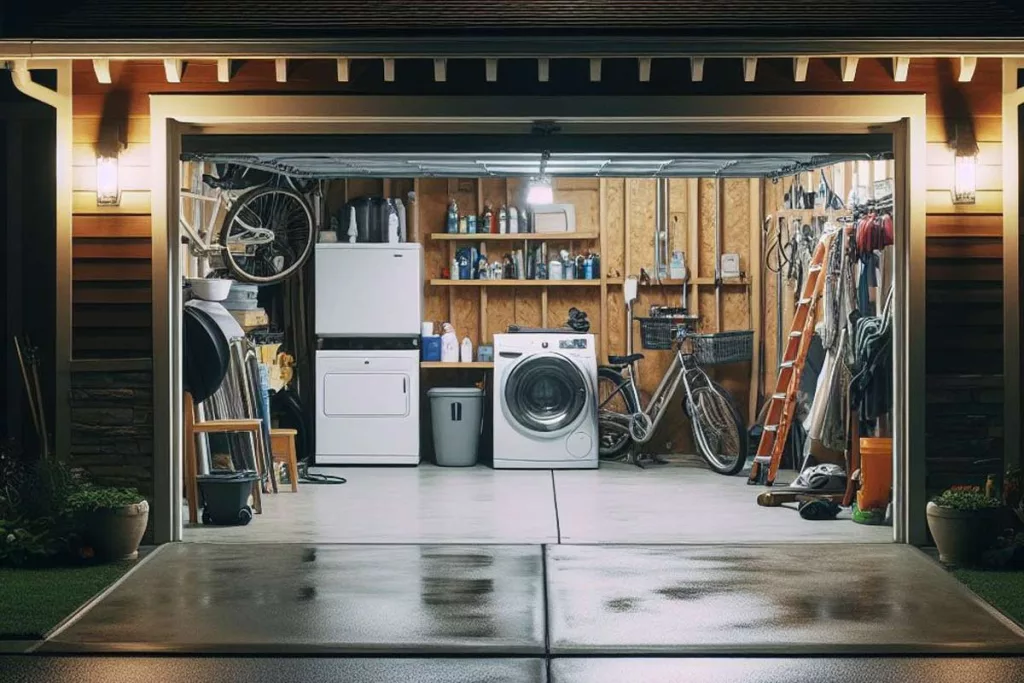
Winter brings chilly temperatures, and if you’re considering storing your washing machine in the garage during this season, there are a few important factors to consider. Freezing temperatures can pose a significant risk to your washing machine, potentially causing damage to its internal components and leading to costly repairs. However, with the right precautions, you can safeguard your appliance and ensure its smooth operation when spring rolls around.
How to keep washing machine from freezing in garage
We have listed some of the most effective measures that you might adopt to ensure that the washing machine in your garage does not freeze in winter.
Water will become ice and expand
If the temperature within your washing machine goes down to approximately 32 degrees Fahrenheit, the chances of water inside the machine being frozen is significantly higher. The implication in this case is that the water can turn to a solid state and can expand.
The water within the machine is mostly kept within a confined place of the washer and the expanded ice might lead the other components to break down below the pressure that has been created for the given expansion. The multiple components that include the pumps and hoses tend to contain a significantly smaller portion of water and it might burst when it shifts to a frozen state and the same could be damaging to a machine and require some repair.
Drain the water
One of the most effective ways to ensure that the washing machine in your garage does not face any kind of damage is by entirely emptying all of the water out of it. If there is no water within the machine, then there will be nothing to become frozen and the cold will fail to make any damage to the said unit.
The first measure concerning the draining process is to ensure that all the water supply lines are successfully detached. Following that, a spin cycle should be run to forcefully push out any remaining amount of water and then detach the drain. Finally, it is suggested that tipping the washing machine forward and backward, and side-to-side to ensure that any stuck water has been drained out completely is a good idea to obtain optimum results.
Hot water
In some cases, you might not prefer to detach the hoses and dry the machine out completely in case you are planning to utilize it for doing laundry irrespective of the kind of fluctuation in water is seen.
In case you tend to use your washer for daily usage and doing large amounts of laundry, then it is recommended to not shut the same during the winter and ensure you are using it daily to refrain from being frozen.
The best thing to do in this scenario is to turn on the water using the hot setting in the machine and run it even when you are not doing any laundry on some occasions. The hot water will make sure that no ice is forming and subsequently stop it from being frozen.
Shut off supply
In case you have any plans that demand you to stay away from home you might be at risk of freezing your washing machine. Therefore, the best thing to do in this event is to ensure that all the water supply is shut off that otherwise goes to the washing machine along with any other appliances.
Now that we have learnt how to keep the washing machine from being frozen in the garage, it’s time to discuss whether or not a washing machine should be kept in a garage.

To be very precise, a garage can’t be considered as an ideal place to store a washing machine as a plethora of downfalls might occur. Some of the most daunting disadvantages that might take place are as follows.
- Freezing of Water Lines: The most significant concern is the risk of water in the washing machine’s hoses and components freezing. This can cause pipes to crack or burst, leading to leaks and potential water damage.
- Damage to Mechanical Components: Cold temperatures can affect the lubricants and moving parts of your washing machine, leading to increased wear and potential mechanical issues over time.
- Inefficient Operation: Extremely cold temperatures can impact the efficiency of the washing machine. The appliance may struggle to operate optimally, resulting in less effective cleaning and potentially longer wash cycles.
- Increased Energy Consumption: Cold conditions may force the washing machine to work harder to heat water to the desired temperature, leading to higher energy consumption and increased utility bills.
- Brittle Seals and Gaskets: Rubber seals and gaskets in the washing machine can become more brittle in cold temperatures, making them prone to cracking or leaking.
- Condensation Issues: Fluctuating temperatures between the cold garage and warmer indoor spaces can lead to condensation on the washing machine. This can contribute to mold and mildew growth.
- Limited Insulation: Garages are often less insulated than the main living areas of a home, subjecting the washing machine to more extreme temperature fluctuations.
- Environmental Impact: Increased energy consumption due to the machine working harder in the cold can contribute to a higher carbon footprint and environmental impact.
- Shortened Lifespan: The combination of freezing temperatures, increased wear on mechanical components, and potential damage to seals and gaskets can collectively contribute to a shortened lifespan for the washing machine.
- Potential for Mold Growth: If the washing machine is not used frequently, moisture can accumulate in stagnant water, providing an environment conducive to mold and mildew growth.
- Difficulty in Stain Removal: Cold water washing may be less effective in removing stains from clothes, affecting the overall cleanliness of your laundry.
- Higher Repair Costs: The cumulative effects of operating a washing machine in a cold garage may lead to more frequent repairs and increased maintenance costs over time.
To minimize these potential issues, consider insulating pipes, providing supplemental heating, and using the washing machine regularly to prevent stagnation during the winter months. Always follow the manufacturer’s guidelines for proper maintenance and usage of your specific washing machine model.
We hope you have gathered sufficient information regarding whether or not to keep a washing machine in a garage from this article. In case you do that, following the above-mentioned steps might be effective to prevent the machine from freezing in winter. Also Read >>>
Leave a Reply